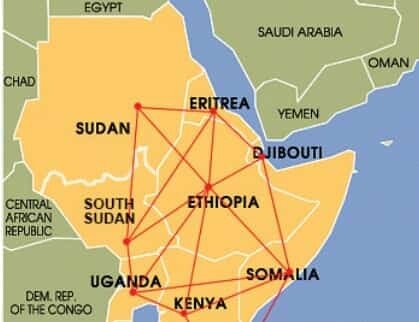
By Dr. Suleiman Walhad
July 28th, 2022
In article dated May 18th, 2022, and published in Zehabesha on energy, I discussed “The consequences of the adverse climatic changes and the energy potential of the region that could help lessen the impact of these adverse weather changes.” The Horn of Africa States is on the move in addressing some of the issues of the region. On July 27th, 2022, the Ethiopia Electric Power Company, a Horn of Africa States company signed an agreement with the Kenya Power and Lighting Company Plc, an East Africa Community company, indicating the two African regions co-operating, and working for their peoples. The project which will consist of a project of some 200 MW power initially to be increased to about 400 MW in due course, is probably one of the largest transregional African projects. It will involve a transmission line stretching 1,068 km (437 km on the Horn of Africa States side and 631 km on the East Africa Community side). It incorporates two AC/DC converter stations on each side.
This is an expansion of the market for the Horn of Africa States power production and heralds an endearing future for the Horn of Africa States. The project is expected to cost some US$ 1.26 billion to be mostly financed by the World Bank (US$ 684 MM), the African Development Bank Group (US$ 338 MM) and the French Development Agency (US$ 118 MM). The remaining part of the funds will be born by the Governments of Kenya (US$ 32 MM) and Ethiopia (US$ 88 MM).
Kenya produces some 3,000 MW capacity of energy production ( Reported by Julia fara - July 2022), while Ethiopia currently enjoys some 4,500 MW ( Country Commercial Guide - July 2022) installed generation capacity. This is expected to rise to some 17,000 MW by 2032 i.e., in ten years time. The current installed capacities of both Ethiopia and Kenya involve traditional gas generated power, solar, geothermal, wind and hydro power. It is this diversification and increase of greener energy towards which the two regions of the Horn of Africa States and East Africa Community are heading, and this is good.
Africa’s energy development progress is on the move and as usual, it is led by traditional hydrocarbon projects, mostly spearheaded by independents, though greener energy sources such as solar, geothermal and hydropower are not far behind. From Senegal far in the West to Somalia in the far East of the African continent, exploration and production development projects are underway, and the continent is expected to be on the forefront of hydrocarbon energy production, despite the climatic changes and the battles against environmental degradation. Gas exploration and production and specially during these challenging times of European demand resulting from the Russian-NATO Ukraine conflict, is expected to expand in the continent both onshore and offshore. It is well known that Africa enjoys vast natural resources of both gas and other minerals in its soil and waters. This is supplemented by the huge solar energy capacity that can be extracted from its major deserts of the Kalahari and Sahara and in general the whole continent, where the sun shines throughout the year, and by its huge hydropower potential from its large rivers from the Limpopo, the Orange river, the Congo, the Zambezi, the Nile and the Niger rivers and many others.
OPEC, the world’s largest cartel now consists of a significant African block, in fact a majority block including Nigeria, Algeria, Libya, Gabon, Angola, Equatorial Guinea and the DR Congo and should the Horn of Africa States soon join, which is likely, the continent would be a major source of the world’s energy supply.
The Horn of Africa States owns a vast energy potential involving all the diverse types of production from hydrocarbon (both onshore and offshore), hydropower, solar, wind and even geothermal. The GERD hydropower project is expected to be the largest hydropower facility in the continent when completed and the Adama Wind project is one of the largest wind energy projects in the continent as well.
Energy should be a driving force for the Horn of Africa States, which is a region that needs to economically integrate and cooperate as the destiny of the region is tied together. The vast blue ocean and seas of the region would also contribute to an interconnected economic system that needs to be activated for the benefit of the vast growing youthful population of the region.
Over the past three decades and many decades before that, the Horn of Africa States region faced challenges, mostly man-made, that involved wars, civil strives, pandemics, droughts and famines and other disasters that do not stay within one boundary. It is why cooperation and integration are most important and necessary, indeed. It is how energy security, food security and political stability can be assured for the populations of the region, which would then share the region’s bounties with the rest of the world and most importantly with neighboring East Africa Community or the Arabian Peninsula on the other side of the Red Sea, the Gulf of Aden and the Somali Sea (northern Indian ocean).
Access to energy is a key component of development. It enables digital and infrastructural connectivity, trade, economic growth in terms of agriculture, blue economy, tourism and industrial production, and eventually poverty reduction. Some of the major obstacles would probably come from the East Africa Community and The Arabian Peninsula as both regions see the Horn of Africa States block as a potential competitor and not as a cooperant, which is not correct. All the three regions are neighbors and need each other and there is nothing better than to cooperate at regional levels instead of at the individual country levels. The countries of the three regions do share many things in terms of spirituality, ethnicities and even historical dimensions. Sometimes those who do not wish the regions well would propagate perceived and ingrained rivalries, which have no basis. Prior to the nineteenth centuries people used to move from one part of these vast regions to another and trade with each other with no particular problems and this can be reinstated through willful actions of the three regions’ leaderships.
An energy-led economic cooperation is crucial for the Horn of Africa States region and would assure of it, a platform for survival, including but not limited to production of goods and services that enrich the lives of the regions’ population – communication, transportation, medical equipment, education and more, which would contribute to the region’s peace, stability and security. The Horn of Africa States, despite its significant energy production capacity, is yet to develop it and exploit it for the benefit of its population and it is on the onus of the leadership to develop these resources to assure of them energy security. A major initial project in this respect, the GERD, has already caused headaches for other countries such as Egypt and Sudan who wrongly assume that the region would actually stop water going downstream – an impossibility of nature. How much such water can a DAM hold? Of course, it depends on the size, but waters the size of the Blue Nile are impossible to hold back, and it would always follow downstream. It will not go upstream, and it would not be wise to keep it all behind a DAM either and evaporate them.
But the Horn of Africa States region needs energy, and it would have to exploit all the resources at its disposal to produce energy for its population, which mostly live in the dark, when it is possible to provide to them some. The GERD is part of these resources, and it would not prevent water from going to Egypt just the Aswan Dam has not stopped waters going to the Mediterranean Sea. With modern technologies, channels can easily be cleaned to keep waters running and not wasted. I noted in my afore mentioned article on Energy in Zehabesha on May 18th, 2002, that “The region enjoys substantial energy sources, and its people should not be energy poor as seems to be the case now. The region must sweat to ensure that its population is not energy poor anymore for as Nigerians say, “success is only 10% ability and 90% sweat.””
*Dr. Walhad writes on the Horn of Africa economies and politics. He can be reached at walhad@hornafric.org
https://zehabesha.com/the-horn-of-africa-states-energy-security/

No comments:
Post a Comment